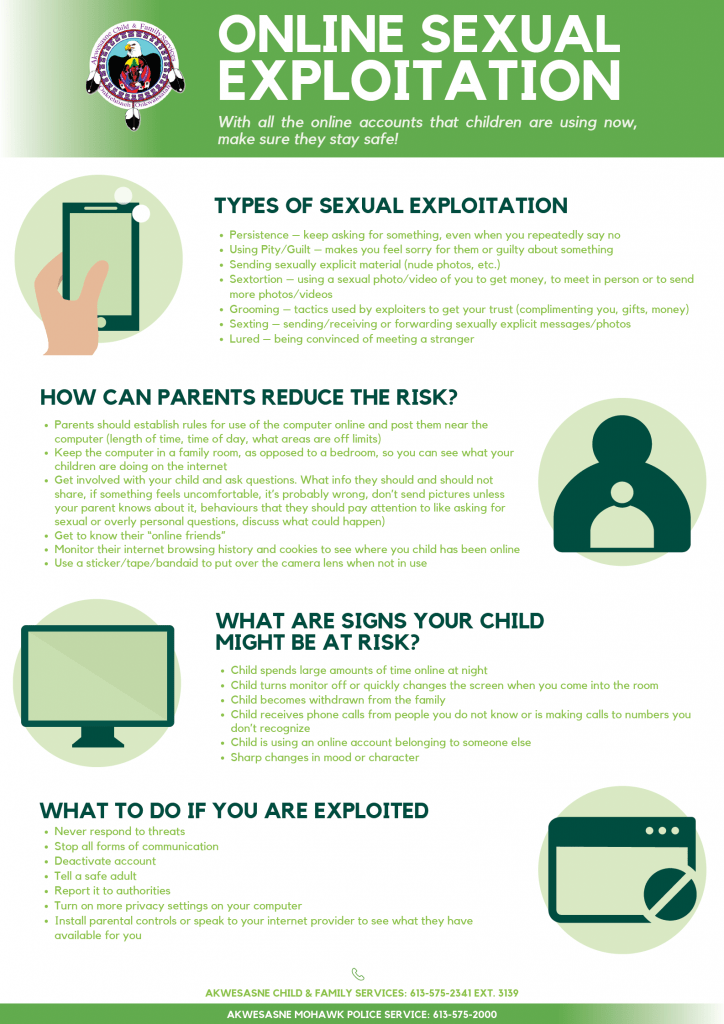ACFS — KEEP YOUR KIDS SAFE ONLINE
Akwesasne Child & Family Services has provided some resources on how you can prevent & protect loved ones against online sexual exploitation. With all the online accounts that children are using now, make sure they stay safe!
TYPES OF SEXUAL EXPLOITATION
• Persistence – keep asking for something, even when you repeatedly say no
• Using Pity/Guilt – makes you feel sorry for them or guilty about something
• Sending sexually explicit material (nude photos, etc.)
• Sextortion – using a sexual photo/video of you to get money, to meet in person or to send more photos/videos
• Grooming – tactics used by exploiters to get your trust (complimenting you, gifts, money)
• Sexting – sending/receiving or forwarding sexually explicit messages/photos
• Lured – being convinced of meeting a stranger
How to Talk to Youth About Sextortion: https://www.cybertip.ca/pdfs/C3P_SafetySheet_OnlineExtortion_en.pdf
Online Luring: https://www.cybertip.ca/pdfs/C3P_SafetySheet_OnlineLuring_en.pdf
HOW CAN PARENTS REDUCE THE RISK?
• Parents should establish rules for use of the computer online and post them near the computer (length of time, time of day, what areas are off-limits)
• Keep the computer in a family room, as opposed to a bedroom, so you can see what your children are doing on the internet
• Get involved with your child and ask questions. What info they should and should not share, if something feels uncomfortable, it’s probably wrong, don’t send pictures unless your parent knows about it, behaviours that they should pay attention to like asking for sexual or overly personal questions, discuss what could happen)
• Get to know their “online friends”
• Monitor their internet browsing history and cookies to see where you child has been online
• Use a sticker/tape/bandaid to put over the camera lens when not in use
Parenting in the Digital World (Tweens & Teens): https://www.cybertip.ca/pdfs/C3P_ParentingintheDigitalWorld_en.pdf
Talking with Teens About Healthy Relationships: https://www.cybertip.ca/pdfs/C3P_SafetySheet_HealthyRelationships_en.pdf
WHAT ARE SIGNS YOUR CHILD MIGHT BE AT RISK?
• Child spends large amounts of time online at night
• Child turns the monitor off or quickly changes the screen when you come into the room
• Child becomes withdrawn from the family
• Child receives phone calls from people you do not know or is making calls to numbers you don’t recognize
• Child is using an online account belonging to someone else
• Sharp changes in mood or character
WHAT TO DO IF YOU ARE EXPLOITED
• Never respond to threats
• Stop all forms of communication
• Deactivate account
• Tell a safe adult
• Report it to authorities
• Turn on more privacy settings on your computer
• Install parental controls or speak to your internet provider to see what they have available for you
For more information or to report, please contact AFCS at 613-575-2341 ext. 3139 (Weekdays: 8 a.m. – 5 p.m.). Community members can also contact the Akwesasne Mohawk Police Service at 613-575-2000 (after hours: 5 p.m. – 8 a.m.).

